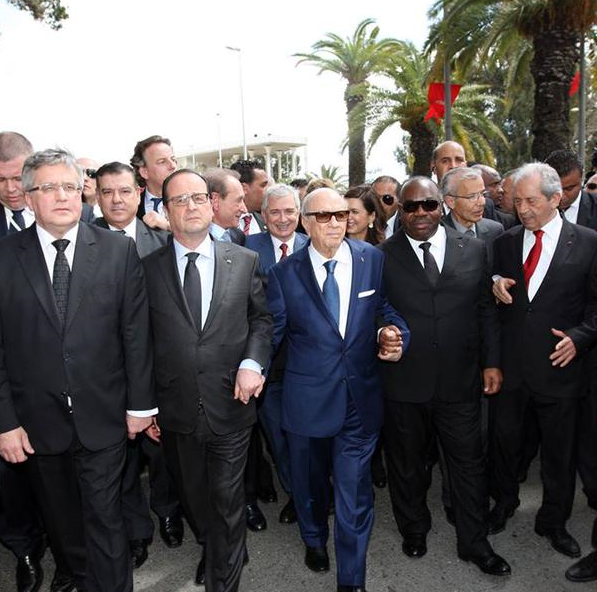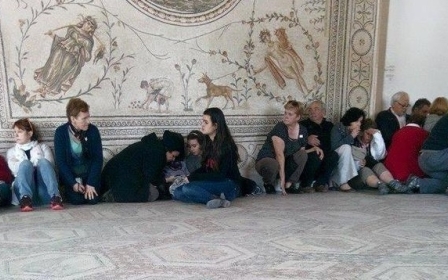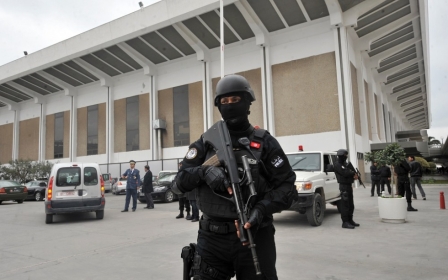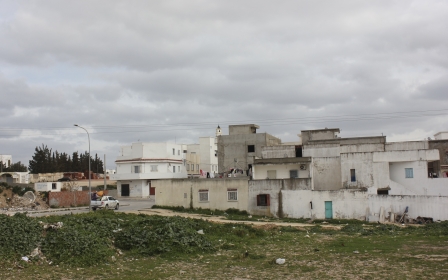Tens of thousands join rally in Tunisia after Bardo Museum attack

A plaque bearing the names of the victims of this month’s attack on a Tunisian museum was unveiled on Sunday, as world leaders gathered to mourn the 24 people killed and to denounce acts of violence.
Tens of thousands of Tunisians took part in a march through the capital Tunis that culminated at the Bardo Museum, the site of the attack that also left at least 47 people injured.
The participants shouted slogans like “Tunisia is free! Terrorism out!” and carried huge cardboard signs bearing the Tunisian flag and the word “Welcome”.
The march was headed by Tunisian President Beji Caid Essebsi, who was joined by French President Francois Hollande, Italian Prime Minister Matteo Renzi, Turkish Deputy Prime Minister Numan Kurtulmus and Algerian premier Abdelmalik Sellal.
Addressing the crowd at the inauguration ceremony, Essebsi stressed that Tunisians “stand as one man to defend our country”.
Participants in the march, some of whom had travelled from across the country, echoed this message of unity.
"This march reflects the national unity of Tunisians, irrespective of their political persuasions, in standing against terrorism," Hussein Tarabulsi, a citizen from the country's northwestern region, told Anadolu Agency.
"The participation of [world] leaders and public officials affirms that the terrorism phenomenon is a global one that everyone is keen to eliminate," Tarabulsi said.
Mahdi Zoraibi, who travelled from Tunisia's southern region to attend the march, for his part, told AA that "terrorism has no place among Tunisians”.
"Tunisia is a conservative Muslim country built on the values of tolerance and fraternity, which stand in stark contrast to terrorism and the killing of innocent people," Zoraibi said.
The march has been likened to the one held in France in January following the attack on satirical magazine Charlie Hebdo, a march that saw the participation of over 40 world leaders.
In the Bardo Museum attack, tourists from Italy, Japan, Poland and Spain were among those killed – a group affiliated to Islamic State later claimed responsibility for the killings.
Tunisian Interior Minister Najem Gharsalli sacked several senior security officials a few days after the attack, which occurred in a high-security zone just meters from the country’s parliament building.
The area is a popular destination for tourists, some 6.1 million of whom flocked to Tunisia in 2014.
Tourism is a key pillar of the economy, and many feared that the Bardo Museum attack, the deadliest to target foreigners in the country since 2002, could severely impact on Tunisia’s financial health.
Bardo Museum, which houses priceless artefacts from the prehistoric and Roman times, is due to reopen to the public on Monday.
The march came hours after Tunisian police announced that the leader of the group suspected of being behind the attack had been killed on Sunday morning.
A total of eight men suspected of links to militant organisations were killed during a raid in the southwestern town of Gafsa, police said on Sunday.
Officials later said that among the group was Khaled al-Shayeb, an Algerian national thought to have been the "architect" of the museum attack.
New MEE newsletter: Jerusalem Dispatch
Sign up to get the latest insights and analysis on Israel-Palestine, alongside Turkey Unpacked and other MEE newsletters
Middle East Eye delivers independent and unrivalled coverage and analysis of the Middle East, North Africa and beyond. To learn more about republishing this content and the associated fees, please fill out this form. More about MEE can be found here.




